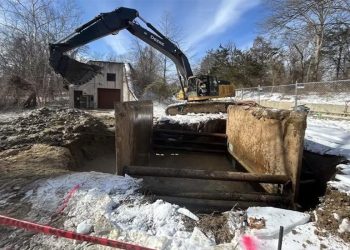Regardless of a stack of proof on the contrary, Related Developers and Contractors Leader Economist Anirban Basu sees persevered room for pessimism in his 2024 financial outlook.
In step with his forecast, a recession is approaching in very overdue 2024. Having maintained that pessimistic outlook for the previous couple of years, Basu has stated that he’s most likely going to be fallacious, similar to he was once in 2023.
“There’s an excessive amount of momentum for the financial system, and till I see the inventory marketplace lose a few of this worth, there may be such a lot wealth flowing in at the moment, the U.S. financial system simply can’t have a recession,” he stated.
Whilst acknowledging that his projection for 2023 neglected the mark and the financial system was once more potent than he expected, he stated there was rising proof of resurfacing inflationary pressures within the country’s nonresidential development phase.
 ABC
ABC
Then again, keeping up his pessimistic standpoint, Basu asserts that roughly two-thirds of the expansion in nonresidential development spending resulted from upper costs being charged as opposed to larger output of supply.
On the crux of any present financial state of affairs is a decision of when/if the Federal Reserve will start up any rate of interest adjustments in 2024. A rising selection of economists, with the exception of Basu, counsel there could also be no fee adjustments. That may lead the U.S. into 2025 with high-interest charges, which might most likely negatively have an effect on development and actual property.
Conversely, Basu forecasts as much as 3 fee cuts this yr. He famous that financial coverage does no longer function instantly; it operates in lengthy and variable lags. His principle is that the entire have an effect on of the upper rates of interest has no longer but totally permeated the U.S. financial system.
The high-interest charges recently observed around the globe are a byproduct of the excessive fee of inflation that was once unleashed in early 2021 when call for for items and products and services got here surging out of the pandemic.
He maintains the Federal Reserve neglected the risk to halt extra inflation when it first were given underway in 2021, due to this fact surroundings off a exertions charge spiral that has but to subside or display up in maximum inflation knowledge. It was once no longer till 2022 that rates of interest began to upward push to fight inflation, which till that time was once categorized as being transitory or fleeting.
“We’re a deeply indebted society recently dealing with excessive borrowing prices and that is the reason what makes me pessimistic in regards to the near-term outlook,” Basu stated, noting that the Federal Reserve is proscribed in its movements with inflation final above the two% function.
A lot of the information he has analyzed continues to turn ongoing financial momentum. Then again, he issues to the continued geopolitical pressures and the approaching federal elections as signs that might not be really useful.
Provide chains as a normal proposition are nonetheless way more loyal than they have been overdue 2021.
“What we get as provide chains make stronger, within the context of unmet call for, is numerous transactional quantity, that is financial expansion and that is the reason precisely what we’ve got observed within the final couple of years,” Basu stated.
Having a look forward a new set of provide chain problems is rising, together with the price of insuring ships and bottlenecks within the Purple Sea, the Panama Canal, and Baltimore.
“This isn’t particularly just right information for individuals who acquire development products and services,” stated Basu. “Along with provide chain problems, there may be an abundance of publicly and privately financed megaprojects across the country, vastly expanding call for for sure inputs.”
Total, he stated the extent of shock in regards to the call for for consulting products and services and the supply of financing for tasks is up.
“The perception that rates of interest will stay upper for longer stays firmly in position, which means that that mission financing prices might be an ongoing factor for development call for, particularly in privately financed segments, for the foreseeable long run,” he stated.
 ABC
ABC
Extensive point of view
On a bigger scale, the shopper stays the main engine of monetary expansion.
Because the get started of the pandemic, Basu stated client spending has persevered to upward push dramatically, at charges some distance upper than the Fed’s recommended normal fee of two% inflation.
“It suggests that buyers, the main engine of monetary expansion, can’t proceed to spend the best way they havebeen,” Basu stated. “That suggests possibly no recession, however some financial slowdown going ahead.”
The snapshot is then of an financial slowdown, with excessive inflation and high-interest charges.
“It is not a super aggregate,” he stated.
From that point of view, Basu returns to the worry about rates of interest.
To take care of a specific way of life and even to transport ahead, extra shoppers are discovering their method into bank card delinquency. To compensate, credit score rates of interest have greater.
Basu believes this may increasingly in the end result in shoppers taking up much less bank card debt as extra bank card issuers are pronouncing no to the following bank card software and extra banks are tightening their requirements for bank card issuance.
As credit score choices are diminished, some shoppers are operating out of suppleness, even digging again to their 401 Okay plans to make ends meet.
“That may stimulate spending within the brief time period, however you’ll be able to consider no less than some unsustainability as neatly,” Basu stated.
Contractor’s view
In step with ABC’s Building Self belief Index and different fresh polls, maximum contractors have a extra constructive view of 2024. Companies are projecting greater gross sales, staffing ranges, and benefit margins over the following six months.
“The price of doing setting up products and services and wages are method up and but there may be sufficient call for available in the market that a lot of you imagine you’ll be able to power your benefit margins nonetheless upper over the following six months,” Basu stated.
Salary will increase and subject matter value fluctuations are anticipated to proceed to have an effect on that self belief.
In the meantime, for companies in public development, Basu admits that virtually none of his forecasts is related because of the quantity of federal investment to be had for infrastructure and schooling tasks. A great deal of the ones finances were programmed and will have to be spent by way of 2026.
As an election yr, development corporations will take an curiosity within the subsequent presidential management. The present management turns out to prefer extra paintings from union-based contractors as opposed to merit-based stores.
“That makes a distinction obviously relating to marketplace proportion, and the cost-of-living infrastructure paintings, he stated. “Total, there may be going to be numerous public cash flowing throughout the financial system for the following 5, six years.”
 ABC
ABC







